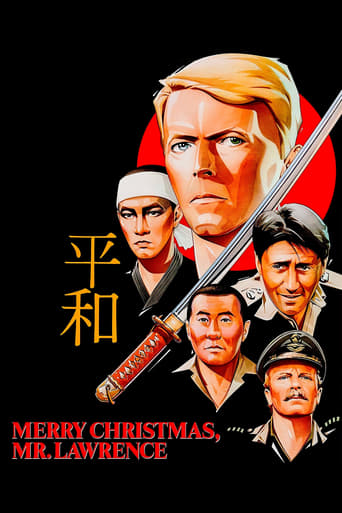treywillwest
This great film by Oshima strikes me as a mirror reflection of his earlier work of avant-eroticism, In the Realm of the Senses. In both pieces, power and desire threaten, in different, competing ways, to usurp subjective humanity.
The earlier movie took place just as the fascist Japanese war machine was fully consolidating itself. The self-effacing abandonment to libidinal joy is presented as the only way to escape a society that would crush the individual by controlling it. To completely abandon control of the self was the only way to escape control by the state. Unfortunately, both too much and too little power and control lead to death and/ or madness.
In this later film, set predominantly during the war in Asia, power has already claimed subjectivity as its captive. Desire still reveals itself, but only through momentary cracks in power's control of the subject. Power must reassert itself all the more brutally after this lapse. Desire therefore results in the greatest suffering, albeit with none of the self-destructive liberation seen in Realm.
The only real hope offered in Merry Christmas, however, still come from momentary lapses of power's control. This slight hope is not the result of desire, but of the intimacy that control accidentally engenders between captive and captor (both of whom are controlled).
davewaldo-114-471767
I first watched this film in 1983 while I was in South East Asia. It is without a doubt the finest, most thoughtful and underrated war film ever made. This film doesn't look for heroes or villains, it try's to tell a story and although the plot is perhaps a bit unlikely, the characters are superbly structured. It is one of the only films that doesn't judge Japanese attitudes towards prisoners, it attempts to explain the treatment towards prisoners by soldiers who considered any soldier that surrendered, rather than fighting to the death, to be below contempt. Laurens van der Post the writer of the book "the seed and the sower" which the film was based on, was himself captured and imprisoned on Java while on a special mission for the British army. This is why this film is deserving of acknowledgment as an honest view of the Japanese and their wartime actions. I find it incredible that nonsensical rubbish like The Bridge Over the River Kwai is voted one of the greatest war films of all time and yet this film doesn't even make the top 100.
ribeirolouanne
« Senjo no Merry Christmas »"Merry Christmas Mister Lawrence" is a sentence used twice in the movie in the middle and at the end, in fact during key times. "Furyo" is the European name of the movie; it refers to the Japanese "war prisoners".Story: The story takes place during World War II in a prisoner camp in Java Island (Indonesia), the camp is led by the Japanese, English and American soldiers are prisoners. Captain Yonoi (Ryuichi Sakamoto) is the director of the camp. He's authoritative, nobody can bear him and all fear him… he embodies the traditional Japanese way of mind, which will be totally jeopardized by a new captive, Jack Celliers (David Bowie) an English soldier. Celliers will defend himself and is state of mind all along the movie. During the movie we follow this total clash of culture between the two soldiers, a clash which will approach them. The two guys… We can notice another duo ,with colonel Jonh Lawrence (Tom Conti) who is able to talk Japanese and sergeant Hara (Takeshi Kitano), they are in good term but the war create a gap between them…Characters: 1-David Bowie is major Jack Celliers… I think it's true to say that it is Bowie's best role on screen , however he ranks under the performance of Conti… moreover it's a bit pity that he didn't take part in the film music just because he thought it could discredit his performance…2- Ryuchi Sakamoto is captain Yonoi, Sakamoto was then considered in Japan as Bowie in the West, he did the soundtrack of the movie. Through him we see all the complexity of the samurai tradition; he doesn't know what to do when facing other customs, there is a part of love and a part of fear; he is already a round character. There are some stereotypes about the Asian performance (for example: the overplay) but here these ones are inexistent he suits the character without any kind of artifact…3- Tom Conti embodies colonel Lawrence, thanks to this movie Conti received an award for the best actor by the National Board of Review, and I think its nothing for such a good performance …4- Takeshi Kitano is Sergeant Genjo Hara, he is the one who says "Merry Christmas Mr. Lawrence" , he is the only Japanese who has something… I don't know… human? First we imagine that he is a flat character (mostly because he drinks a lot) but we realize it's wrong, he is a key character in the storyThere are many more characters but these ones are the most important. However it's a shame that Conti and Kitano don't appear on the European cove because they are as interesting as Bowie and Sakamoto!The soundtrack: In this movie you cannot forget to talk about the soundtrack! First: because there are two pop stars in the movie: David Bowie and Ryuichi Sakamoto…and because it's just wonderful. Sure Bowie didn't take parts of it but whoa! I'm just breathtaking by so much emotion just in a song…Personal opinion :Sure everything is clever, the actors performance, the different scenes with many long shots which are great, and the soundtrack, sorry The soundtrack! But I don't want to watch it again … I don't know why , I was not so impressed
Al_The_Strange
There's not really much of a plot to this WWII POW-themed prison movie, but that doesn't stop it from being wholly boring. From the start, the film features a fair amount of interesting (and memorable) scenes, a cast of fairly interesting characters, and a fair amount of rough brutality. For the latter, it can be frustratingly difficult understanding why certain characters are so mean-spirited. But it's even more frustratingly difficult accepting any character as purely good or purely evil; they're all evenly developed with depth and humanity that expresses both the harsh malice of war and the camaraderie of peace. This can make the movie rather convoluted and off-putting, but it is fitting in its own right; the film doesn't favor one culture over another, even though the two conflict constantly (and ultimately, the differences between honorable Japanese etiquette and honorable English manners stand out as a prominent theme throughout this film).The film is well-filmed with plenty of interesting photography, unique settings and locations, interesting color and lighting schemes, and a quality realistic-looking production value. Performances (including the talents of Tom Conti, David Bowie, Ryuichi Sakamoto, and Takeshi Kitano) are strong. Ruichi Sakamoto also performs the music score, which is quite interesting.If you enjoyed "Bridge on the River Kwai" or "The Great Escape" and don't mind seeing a similar movie with no big action scenes, this movie may satisfy you.









